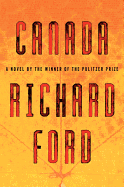
Few books begin with such a powerful narrative hook as Richard Ford's Canada: "First, I'll tell about the robbery our parents committed. Then about the murders, which happened later." Dell Parsons and his twin sister, Berner, are settled into their lives in Great Falls, Mont., in the 1950s. But their father, a World War II veteran, has a core of restlessness that is about to tear their family apart. He is aided in this by his wife, the twins' mother, whose dissatisfaction with rural life ends up dovetailing with the anarchic dreams of her husband.
Despite its forceful opening, Canada is a densely introspective novel, as Dell traces the psychological and emotional consequences of his parents' actions.
The theme of boundaries resurfaces in the novel again and again: although the robbery has a cataclysmic effect on Dell's life, his parents did it for reasons that had nothing to do with him, with individual fates independent of his. Dell is more connected with his twin sister than any sibling could be, until she all but renounces her ties to him. There is the boundary between a normal childhood and a permanently traumatized one. And finally, Dell crosses the border from Montana into Saskatchewan, Canada, a physical boundary that represents his transition to a new life after his parents miserably fail to realize the American Dream.
One would think that Dell might find stability on the Canadian side of the border. As it turns out, though, once Dell reaches Canada, his troubles are just beginning. --Ilana Teitelbaum, book reviewer at the Huffington Post

